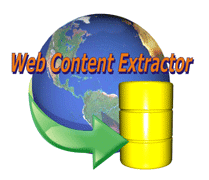What is Web Content Extractor?
Web Content Extractor is a specialized software tool designed to scrape data from websites. This is accomplished by automating the retrieval of specific information from the web pages, converting the HTML code into structured data formats like JSON, CSV, or XML. Web Content Extractor allows users to define what kind of data to scrape, from which websites, and how often this data should be updated. The tool provides a range of functionalities including but not limited to pattern recognition, pagination handling, and multi-threaded operations.
| Feature | Description |
|---|---|
| Pattern Recognition | Identifies common structures in web pages for data scraping |
| Pagination Handling | Navigates through multiple pages to collect data |
| Multi-threading | Allows multiple scrapes to happen simultaneously |
What is Web Content Extractor Used for and How Does it Work?
Web Content Extractor is primarily used for the following purposes:
- Market Research: Gathering data on consumer behavior, market trends, and competitor pricing.
- Data Mining: Collating vast amounts of data for analysis and insight generation.
- Content Aggregation: Scraping articles, blogs, or news from different sources for a centralized content platform.
- SEO Analysis: Extracting keyword rankings, backlink information, and other SEO-related data.
- Automating Manual Data Entry: Automating the collection of data from online forms and databases.
The software works by first sending an HTTP request to the URL of the target website. Once the web page is loaded, the software scans the HTML code to locate the data as per pre-defined configurations. It then extracts this data and stores it in a structured format for further use or analysis.
Why Do You Need a Proxy for Web Content Extractor?
Using a proxy server while running Web Content Extractor offers several critical advantages:
- Anonymity: Proxy servers mask your original IP address, making it difficult for websites to track or block your scraper.
- Rate Limiting: Many websites impose a limit on the number of requests from a single IP address. A proxy helps to circumvent this by rotating IPs.
- Geo-Targeting: Data can be extracted from websites that are geo-restricted by using a proxy server located in a specific region or country.
- Concurrency: Multiple requests can be made in parallel by employing multiple proxy servers, thus speeding up data extraction.
- Reduced Risk of Being Blocked: Employing a quality proxy reduces the risk of your scraper being identified and subsequently blocked.
Advantages of Using a Proxy with Web Content Extractor
- Data Accuracy: Using a premium proxy service like OneProxy ensures that you get reliable and accurate data by avoiding CAPTCHAs and rate limitations.
- Scalability: With a pool of premium proxies, you can scale your scraping operations efficiently.
- Cost-Effective: Automating data extraction with proxies can significantly reduce the man-hours required for data collection, thereby saving costs.
- Legal Compliance: A quality proxy service will adhere to web scraping guidelines and regulations, ensuring that you stay on the right side of the law.
- Enhanced Performance: Quality proxy services offer high-speed servers, which means quicker data extraction and lower downtime.
What are the Cons of Using Free Proxies for Web Content Extractor
- Unreliable: Free proxies are often slow and frequently go offline, disrupting the scraping process.
- Data Integrity: These proxies can alter the data between the client and the server, leading to inaccurate results.
- Security Risks: Free proxies are prone to injecting malicious ads or malware.
- Limited Bandwidth: Free services usually have bandwidth restrictions, causing delays in data extraction.
- Legal Concerns: Free proxies may not adhere to legal guidelines, putting you at risk of breaching laws.
What Are the Best Proxies for Web Content Extractor?
When selecting a proxy for Web Content Extractor, consider the following attributes:
- Anonymity Level: High anonymity level proxies are ideal for web scraping as they offer maximum security.
- Speed: Opt for proxies that offer high-speed data extraction.
- Location: Choose a proxy that can mimic locations if your data extraction task requires geo-specific information.
- Type of Proxy: Datacenter proxies like those offered by OneProxy are well-suited for web scraping due to their speed and reliability.
How to Configure a Proxy Server for Web Content Extractor?
- Acquire Proxy Details: Purchase a premium proxy service like OneProxy and collect the proxy server details (IP address, port number, username, and password).
- Open Web Content Extractor: Navigate to the settings or options menu within the software.
- Locate Proxy Settings: Usually found under ‘Network Settings’ or ‘Connection Settings’.
- Enter Proxy Details: Input the IP address, port number, and if required, the username and password.
- Test Configuration: Most tools offer a ‘Test’ button to ensure that the proxy server is correctly configured.
- Save and Apply: Save the settings and restart Web Content Extractor to apply the changes.
By following the above guidelines, you can unlock the full potential of Web Content Extractor and ensure efficient, reliable, and legal web scraping.













